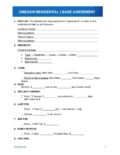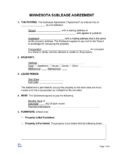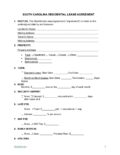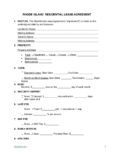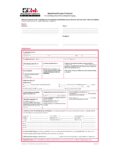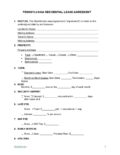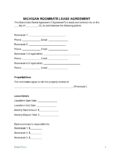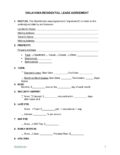Standard Lease Agreement
Required Disclosure Forms (3)
- Lead-Based Paint Disclosure Form – Landlords are required to disclose the presence of lead-based paint if the property was constructed prior to 1978.
- Landlord/Owner Identification – The landlord or owner must provide their contact details and mailing address for sending notices.
- Unequal Deposits – For rental properties with more than four connected units, landlords must clarify the methods used to calculate deposits.
Sources
Sample South Carolina Residential / House Lease
Rhode Island Rental Application Form– A rental application is a form potential tenants fill out to apply for a property. Landlords and Property Managers use this document to gather information and decide if the applicant is a good fit. Once approved, both parties can sign the Rhode Island Residential Lease Agreement Template.
🏠 Rhode Island Tenant Rights & Landlord Obligations
Tenant Rights
- Right to habitable living conditions
- Privacy rights and proper notice for entry
- Protection from discrimination
- Timely return of security deposits
- Right to organize tenant associations
Landlord Obligations
- Maintain property in habitable condition
- Make necessary repairs promptly
- Provide required disclosures
- Follow proper eviction procedures
- Respect tenant privacy rights
Required Disclosure Forms in New Jersey – 4
Rhode Island landlords must provide specific disclosures to tenants as mandated by state law. Failure to provide these disclosures can result in legal complications and potential liability.
- Lead-Based Paint Disclosure Form – If the property was built before 1978, landlords must notify tenants about potential lead-based paint potential hazards.
- Code Violations (if any)- Landlords must disclose to tenants if there are any outstanding code violations against the property. [Truth-in-Renting Act]
- Landlord/Owner Identification – Landlords must share the names of property managers, property owners, and anyone authorized to receive legal notices, to adhere to the Landlord Identity Law.
- Security Deposit Information – Banking details and return procedures. Landlords must disclose where security deposits are held, applicable interest rates, and the process for returning deposits after lease termination.
Sample Rhode Island Residential Lease Agreement Template
Frequently Asked Questions
Is a rental application fee legal in Rhode Island?
Yes, landlords in Rhode Island can charge reasonable application fees to cover the cost of background checks and credit reports. However, the fee should be limited to actual costs incurred.
How long does a landlord have to respond to a rental application?
While Rhode Island doesn’t specify a timeframe, most landlords respond within 1-3 business days. It’s recommended to follow up if you haven’t heard back within a week.
Can a landlord reject an application based on income?
Yes, landlords can set income requirements (typically 2.5-3 times the monthly rent) as long as these standards are applied consistently and don’t discriminate against protected classes.
Texas Landlord Tenant Laws
Sources
Sample Texas Apartment Association Residential Lease
Required Disclosure Forms (1)
- Lead-Based Paint Disclosure Form and EPA Pamphlet – Landlords must disclose if the property was built before 1978. [1]
Security Deposit Laws
Sample Pennsylvania Residential Lease Agreement
Sources
Sample Michigan Room (Roommate) Rental Lease
Required Disclosure Forms
- Lead-Based Paint Disclosure Form and EPA Pamphlet – Landlords must disclose if the property was built before 1978.
- Flooding – This document informs tenants about a property’s flood risk.
- Identity Disclosure – The landlord or property manager must disclose full mailing address where notices can be sent.
- Methamphetamine Disclosure – This document informs tenants if a property has been used to make or use methamphetamine or if it may be contaminated with methamphetamine.
Security Deposit Laws
-
- Maximum Amount – No limit.
- Returning to the Tenant Rules – 45 days.
Sample Oklahoma Residential Lease Agreement Template
Required Disclosure Forms
- Lead-Based Paint Disclosure Form and EPA Pamphlet – Landlords must disclose if the property was built before 1978.
Security Deposit Laws
-
- Maximum Amount – There no maximum amount that’s mandated in Ohio.
- Collecting Interest – If the deposit exceeds $50 or one (1) month’s rent (whichever is greater) and the lease is at least six (6) months, then the Landlord must keep it in a 5% interest-bearing account. [1]
- Returning to the Tenant – The Landlord must return the deposit within 30 days of the lease end date.[2]
Sample Ohio Standard Residential Lease
Sources
Required Disclosure Forms
- Lead-Based Paint Disclosure Form and EPA Pamphlet – Landlords must disclose if the property was built before 1978.
- Property Condition Statement (Move-in Checklist) – The Landlord and Tenant must sign this statement about the property’s condition before the Tenant moves in. [1]
Security Deposit Laws
-
- Maximum Amount – The Landlord can collect one (1) month’s rent. The Landlord can charge an amount of up to two (2) months’ rent from a Tenant convicted of a felony or with a judgment for breaking a previous lease. [2] [3] [4]
- Returning to the Tenant Rules – The unused portion of the deposit must be returned to the Tenant within 30 days of the lease end date. If any deductions were taken out then the Landlord must provide an itemized list. [5]
